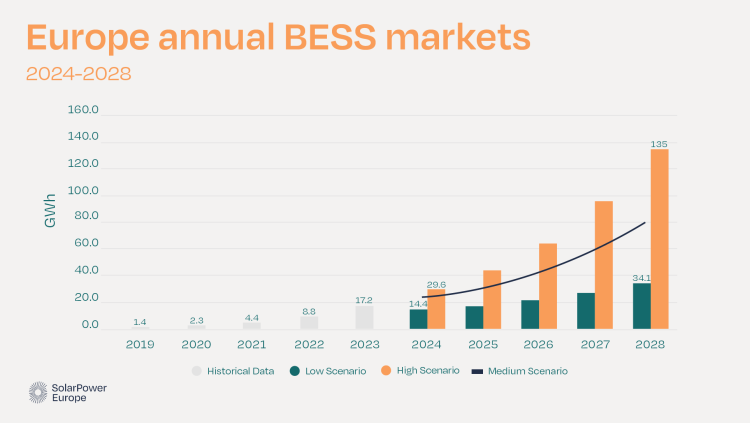Highlights
- Latest analysis from SolarPower Europe reveals that, in 2023, Europe installed 17.2 GWh of new battery energy storage systems (BESS); a 94% increase compared to 2022. This marks the third consecutive year of doubling the annual market.
- By the end of 2023, Europe's total operating BESS fleet reached around 36 GWh. The residential segment accounted for 63% of this capacity, followed by large-scale battery systems (21%), and commercial & industrial systems (9%).
- Germany led the market with 34% of the European market share in 2023, followed by Italy (22%), and the United Kingdom (15%).
- Although deployment is expected to continue to grow in 2024, projections still fall short of the estimated 200 GW of battery power capacity needed by 2030 to unlock the EU's solar potential. Battery storage faces obstacles across Europe, including missing targets, insufficient market signals, double taxation, and restrictive grid policies for hybrid renewable installations.
In 2023, the equivalent of 1.7 million more European homes became solar battery powered. According to the latest analysis from SolarPower Europe, 17.2 GWh of new BESS capacity was installed in Europe in 2023, experiencing an impressive 94% increase compared to 2022.

Walburga Hemetsberger, CEO of SolarPower Europe, said, "Growing battery storage and flexibility represents a fundamental shift from our current grid-centric view of the market. It impacts not only the way we plan infrastructure and the way we operate the system, but also the markets we engage with.
The new Electricity Market Design (EMD) legislation lays the groundwork for a more robust energy policy. We need to urgently implement these measures and call on the European Commission to report on the EMD implementation ahead of the first Energy Council in 2025."
Read our European Market Outlook for Battery Storage 2024-2028
DownloadIn tandem with solar PV, growth was predominantly propelled by home batteries. In the wake of the energy crisis, European citizens turned to batteries to build their energy self-sufficiency. The residential segment led deployment with 70% of the annually installed BESS capacity, followed by large-scale battery systems at 21%, and commercial & industrial systems at 9%.
2023 marks the third consecutive year of doubling the annual market, with total battery storage capacity reaching 35.9 GWh by the end of 2023.
Germany maintained its position as the leading market, deploying 5.9 GWh last year and marking a significant increase of 152%. Italy closely followed, connecting a record-breaking 3.7 GWh (+86%), trailed by the United Kingdom with 2.7 GWh (+91%).
Looking forward, BESS markets will maintain their upward trajectory between 2025 and 2028, with sustained, but slower, growth rates in the 30-40% range.
The overall installed BESS capacity in Europe is projected to expand more than sevenfold to reach 260 GWh of battery storage by 2028.
Antonio Arruebo, Market Analyst at SolarPower Europe said, "Over the past decade, decreasing investment costs for battery storage, driven by technological advancements, economies of scale, and lower raw material prices, have significantly enhanced the cost competitiveness of solar PV paired with battery storage. This combination already represents an optimal solution addressing our energy trilemma of security, sustainability, and affordability."
Nonetheless, with the severity of the fossil energy crisis reduced for now, the immediate incentive for European households to invest in self-sufficiency becomes less apparent. This shift may potentially diminish the appeal of solar and storage solutions.
Michael Schmela, Director of Market Intelligence at SolarPower Europe, said, "While policymakers have focused on batteries for electrifying the automotive industry, their critical role in the green transition of the European power system has been largely overlooked. Flexibility through battery storage isn't solely a technical matter for regulators and standardisation bodies; it demands immediate political attention and prioritisation."
The growth of renewables is reliant on the adoption of clean flexibility sources like batteries, essential for transportation and heating electrification, as well as grid modernisation. SolarPower Europe is calling for a comprehensive EU electricity storage strategy and a target of 200 GW by 2030.
Notes
- The storage target is expressed in power capacity (GW), which is the total amount of electricity that a battery can store. Battery storage capacity (GWh) in turn, refers to the charge stored by the battery, and the amount of energy that can be extracted from the battery under certain specified conditions.
Contact
Ludovica Longo
Press and Communications Advisor
l.longo@solarpowereurope.org










